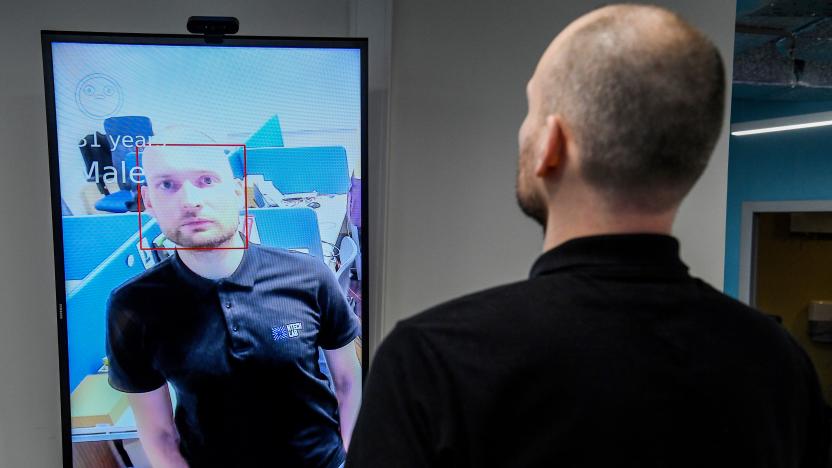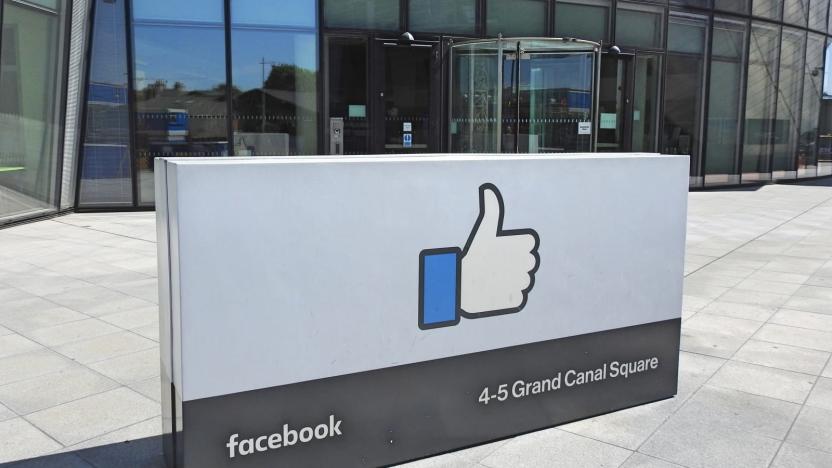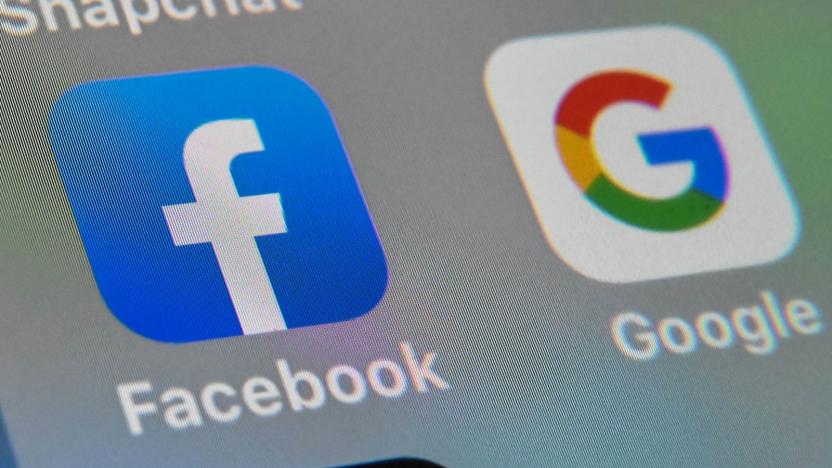data protection
Latest

MIT's 'PhotoGuard' protects your images from malicious AI edits
A new digital watermarking technique for MIT CSAIL seeks to prevent unauthorized image edits by malicious AI.

GDPR fines skyrocket as EU gets tough on data breaches
The EU is ready and willing to enforce data breaches against companies with lax security.

UK court rules police facial recognition trials violate privacy laws
Facial recognition is unreliable, dystopian and, according to a British court, incompatible with privacy and data protection legislation.

Facebook Dating's Valentine's Day launch in Europe is canceled
Facebook has been forced to withdraw a planned rollout of Facebook Dating in Europe after Irish data protection regulators stepped in. The service was due to launch in time for Valentine's Day, but Facebook pulled the plug after officials raised concerns about its compliance with EU law.

Twitter introduces a Privacy Center to keep users informed
Today, Twitter launched a Privacy Center, where it will share announcements, new privacy products and communication about inevitable security incidents. "By using Twitter, you've shown us that you trust us with your data," the Twitter Privacy Center states. "We do not take that trust lightly."

Amnesty International: Facebook and Google are a threat to human rights
Amnesty International, the premiere human rights organization, says Facebook and Google pose an unprecedented systematic threat to human rights. Specifically, Amnesty is concerned with the companies' "pervasive surveillance." In a new report, the organization warns against what it calls "omnipresent surveillance of billions of people" and calls for a "radical transformation of the tech giants' core business model."

Presidential hopeful Andrew Yang wants your data to be your property
Andrew Yang, the tech entrepreneur turned Democratic presidential hopeful, may not be a leading candidate in the race, but he has gained attention for his unique ideas about how to address technology -- the companies behind it and the impact it's having on the country. He has proposed giving every American $12,000 per year to soften the blow of jobs lost to automation, and he has toyed with campaigning via hologram. While these ideas have come out in bits and pieces, Yang officially revealed his comprehensive tech policy today.

The EU may give citizens more control of their facial recognition data
The EU may impose strict limits on the use of facial recognition technology. According to Financial Times, the European Commission is working on laws that would give citizens explicit rights over their facial recognition data, like the right to know when it's used. The regulations would apply to both businesses and police or security forces.

UK regulator to hit British Airways with record fine over 2018 hack
The UK's data privacy authority has announced it intends to levy its largest ever fine against airline British Airways (BA). The airline will have to pay £183.39 million ($230 million) to the Information Commissioner's Office (ICO) for failing to protect its customers' data.

Engadget giveaway: win a Sony Xperia Z3 Tablet Compact courtesy of F-Secure!
You lock your door, cover your PIN at the ATM and have your homescreen password protected, but what about that data connection? The coffee shop WiFi could be a data-skimmers hangout and you may not have noticed that card game app you've been playing is malware. F-Secure's Freedome helps take care those mobile security issues and has a few other tricks up its sleeve, too. Freedome can mask your IP address to keep it safe from snoops and if you're a world traveler, you can select a virtual location, so your House of Cards binge session won't be interrupted by unsupported regions. F-Secure has provided us with a Sony Xperia Z3 Tablet Compact and a one-year, three-device subscription to Freedome so one lucky Engadget reader will be able to surf in style and safety. Just head down to the Rafflecopter widget below and you'll get up to three chances at winning this tablet and mobile security software combo. Winner: congratulations to Noah A. of London, ONT.

DARPA is trying to reinvent online privacy
You can't help but admire DARPA's tech, even when it could track you down and murder you. However, the military agency's latest program actually wants to make it harder to find folks and their valuable data. Named after right-to-privacy pioneer, Supreme Court Judge Louis Dembitz Brandeis, the Brandeis program "would allow individuals, enterprises and US government agencies to keep personal and/or proprietary information private." We imagine that the emphasis is on "government agencies," though DARPA said its systems would work for everybody. Reading between the lines, we'd say the US government has seen one too many cyber-attacks, and wants its top eggheads on the job protecting confidential information.

Paranoid? You can destroy this SSD simply by texting it
In the age of Snowden and the NSA, no method of data protection is apparently too kooky for consideration. Exhibit 'A' is a new SSD drive from a company called SecureDrives (after the break). It has features like you'd expect like 256-bit hardware level encryption and 2-factor authentication, but that's just a warm-up. The pièce de resistance is the ability to erase the GSM-enabled drive by sending a text, causing the NAND flash storage to fragment in an unrecoverable way. The self-destruct process can also be triggered if someone tries to block the drive's GSM signal, tamper with it, remove it from your computer or try the pin code too many times. All of that should keep your Bitcoin stash safe, but first you'll need to part with a lot of them -- the top-end Autothysis128t drive runs £1,027, or about $1,650.

A look at Apple's security efforts in 2012
Digital security is a topic that always seems to grow in importance, and with each wave of new Apple hardware, security sleuths go back to work examining what new exploits exist and what old holes have been patched up. Rich Mogull of TidBITS recently took an exhaustive look at Apple's 2012 security changes, and overall, it appears the company is indeed on the right track. "Apple's security is, across the board, stronger now than at any time in the nearly eight years I've been researching and writing about the company's products and services," writes the veteran security analyst. Mogull goes on to praise the addition of Gatekeeper in the latest OS X iteration, as well as iOS 6's ability to hold off most proper (read: untethered) jailbreaking efforts. However, Mogull is quick to note that no form of digital security is foolproof, and things have a habit of changing rather rapidly in the world of digital privacy. Still, the outlook -- at least in terms of Apple's efforts -- is good, and as long as Apple doesn't fall asleep at the wheel, Mac and iOS users appear to be in capable hands. You can read the full rundown on TidBITS.

Facebook shutting down facial recognition in the EU, gets stamp of approval from Ireland DPC
Earlier this year, Ireland's Data Protection Commissioner, a body whose decisions impact Facebook's policies in Europe at large, made several recommendations to bring the website in line with regional privacy laws, calling for greater transparency on how users' data is handled and more user control over settings, among other things. The DPC just officially announced that Zuckerberg et al. have for the most part adjusted its policies accordingly. The biggest change involves the facial recognition feature, which attempts to identify Facebook friends in photos and suggest their names for tagging. The social network turned off this functionality for new users in the EU -- and it will be shutting it down entirely by October 15th. It's not like Ireland, home to Facebook's European HQ, is the first to give the site flack about such features: Germany was having none of it when the site introduced facial recognition last summer.

European Commission outlines plans for Internet of Things regulation
The Internet of Things is on the rise, and when things get big, they tend to get regulated. The European Commission has spotted this trend, and has decided to get its rubber stamp ready, in a bid to protect individual rights from all the data that it collects, as well as "unleash the potential economic and societal benefits." While this may seem like bureaucratic party-pooping, the Commission points out that much of the information carried includes personal location, preferences and behavioral patterns. There will be an initial consultation to determine the required privacy and security of an IoT infrastructure which will then be fed into the Commission's recommendation -- expected to be presented in summer 2013. The good news is that there's a survey open to citizens and businesses to have their say on how on how the regulation should be administered. Check the more coverage link below to make your opinions heard.

EU regulators ask Google to 'pause' its privacy changes, need more time to investigate
Google has gone to great lengths to clarify its revamped privacy policy, but a regulatory body in the European Union thinks the company is moving a little too fast. Today, European regulators formally requested that Google "pause" its rollout, in order to give the EU more time to investigate its forthcoming changes. "Given the wide range of services you offer, and the popularity of these services, changes in your privacy policy may affect many citizens in most or all of the EU member states," the EU's Data Protection Working Party wrote in a letter to Google CEO Larry Page yesterday. "We wish to check the possible consequences for the protection of the personal data of these citizens in a coordinated way." The body didn't specify how much time it would need to investigate, but it stressed that doing so would help to ensure absolute transparency among European users. "[W]e call for a pause in the interests of ensuring that there can be no misunderstanding about Google's commitments to information rights of their users and EU citizens, until we have completed our analysis," the letter reads. Viviane Reding, Europe's commissioner on data protection, heralded the move as an important step in asserting EU authority over online privacy and regulations, but Google was somewhat taken aback by the request. "We briefed most of the members of the working party in the weeks leading up to our announcement," said company spokesman Al Verney. "None of them expressed substantial concerns at the time, but of course we're happy to speak with any data protection authority that has questions." It's worth noting that Google isn't legally bound to heed the Working Party's request, though we'd expect the company to seek some sort of compromise with Europe's regulators, as it has in the past.

Don't tell us where you're going, Nissan Leaf driver, we already know (video)
That cute little bugger above certainly looks innocent enough, but it might have been spreading some pretty detailed gossip behind your back. Leaf-driver Casey Halverson was playing around with the RSS reader in his Carwings system when he discovered that it wasn't just collecting feeds from RSS servers, it was also telling those servers his car's current location, speed, heading and even the destination he'd set in the sat nav. Strangely, Halverson's undercover tattletale appears to have halted its indiscretions after he posted the discovery on his blog, but we're surmising there's still hundreds of server logs up and down the country that prove it really happened, not to mention his video after the break. Cue Rockwell, fade to black.

Droid Incredible saves browser screenshots to internal memory, turns into a privacy nightmare?
digg_url = 'http://digg.com/gadgets/Droid_Incredible_saves_browser_screenshots_to_internal_memor'; June must be the month when privacy issues leave their hibernation and return to trouble our fragile minds. First we had Flash going loco, then AT&T's airwaves exploded with iPad users' email addresses, iPhone 4 pre-orders started sending people to the wrong account, and now this. Boy Genius Report has come across a rather worrying "feature" of the HTC Sense bookmarking widget on the Incredible, which takes sporadic screenshots of your browsing sessions. That wouldn't be so bothersome in itself, but try to remove said pictures, and you find where the problem lies. Ending the browsing session, deleting your history, and even a full reset to factory settings failed to eviscerate the indiscreet imagery. You have to manually discover their location and delete them by hand. Considering the high likelihood of Incredibles being sold and resold for years to come, this could turn the phone into a little cache of treasure for the proactive identity thief. And since it's a Sense issue, it might be affecting other HTC handsets as well. Wunderbar.

Axxana Phoenix backup system promises to withstand earthquakes and other disasters
It's not exactly for everybody, but those looking to spare no expense when it comes to protecting their data may want to strongly consider adding Axxana's elaborate Phoenix backup system to their shopping list (just below the Bond villain hideout and above the robot army). At the heart of the system is the Phoenix Black Box pictured above, which houses an SSD array that stores your essential data, and packs both WiFi and 3G connectivity to let you retrieve it even if the box itself is inaccessible -- which it may well be, considering that it's designed to withstand earthquakes, floods, and other disasters (including shocks up to 40 Gs and temperatures up to 2,000 degrees Fahrenheit). Of course, the system also gets paired with a remote backup service for an added layer of protection, and you'll have access to a full range of management tools to keep an eye on your data at all times.[Via OhGizmo]

Maxtor expands options in Shared Storage, OneTouch lineup
It looks like Western Digital isn't the only hard drive firm broadening the horizons of its oh-so-popular external lineup, as Maxtor has announced today a trio of revamped devices sporting the same technologies (and less-than-sexy enclosures) we've come to expect, but also gain welcome upgrades in the file space department. The company's flagship unit, the OneTouch III Turbo Edition, now tips the scales at 1.5TB, and still touts the same "user-configurable RAID," automatic backup scheduling, "System Rollback," USB 2.0 connectivity, and DriveLock software to protect your precious information (or priceless game saves) from the grimey hands of data thieves; meanwhile, the non-Turbo edition now comes in a 750GB single-drive flavor, while the Mini tops out at 160GB. Rather than cramming more space into its Shared Storage II drives, Maxtor now offers single-drive versions in 320GB and half-terabyte sizes, and includes software to facilitate "easy backup scheduling between networked computers," detailed storage status to all connected users, and a pair of USB 2.0 ports. If you're just too occupied to schedule your own backups, or just need a less expensive alternative to an in-home NAS, Maxtor's refreshed offerings will have you covered later this month.[Via eHomeUpgrade]












